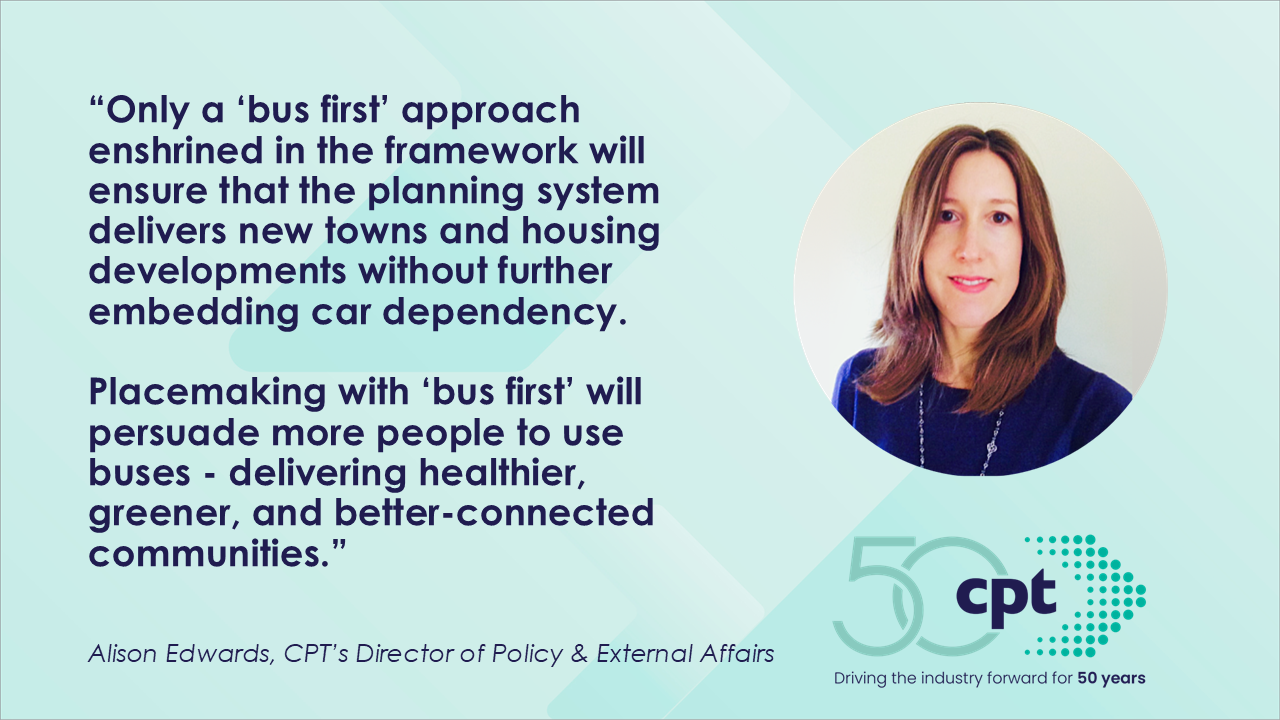September 25 2024
The Confederation of Passenger Transport (CPT) has today published its response to the government’s consultation on proposed reform to the National Planning Policy Framework (NPPF) as well as other changes to the planning system.
CPT has welcomed the opportunity to respond to the government’s proposals for planning reform, arguing they offer a vital opportunity to reset the relationship between planning and public transport.
Alison Edwards, Director of Policy & External Relations for the Confederation of Passenger Transport (CPT) says,
“CPT and its members believe that a vision-led approach to future planning that promotes sustainable transport must put buses and coaches front and centre.
“Only a ‘bus first’ approach enshrined in the framework will ensure that the planning system delivers new towns and housing developments without further embedding car dependency. Placemaking with ‘bus first’ will persuade more people to use buses - delivering healthier, greener, and better-connected communities.
“This approach is also essential to give bus and coach operators the long-term assurance they need to invest in routes and to strengthen their relationships with the communities they serve.”
In its consultation response CPT argues that a bus-first vision for placemaking should be integrated within the NPPF as well as into the broader planning and economic policies of the government.
Likewise, the reformed NPPF should be worded to become more assertive in promoting public transport. As with walking and cycling, the planning system needs to make taking the bus a more attractive option.
ENDS
Download CPT's full response to the NPPF consultation.
Notes for Editors
Research published recently by CPT has underscored the importance of delivering the right bus networks: The Economic Impacts of Local Bus Services shows 10% of all high street spending comes from bus passengers, while every pound invested in bus delivers over four times that in economic benefits.
Of 803,000 houses built between 2011 and 2019 in and around city and town centres, 91.5 per cent have been built in suburban locations (https://www.bbc.co.uk/news/explainers-51577853, February 2020) due in part to the availability of suitable land, and to current planning rules around urban density. This has also locked in greater levels of car dependence.
Buses are a highly sustainable transport mode, with the average bus journey emitting between 2.6 and 3.5 times less CO2 per passenger than the average car journey. Each bus can take up to 75 cars off the road, significantly boosting air quality, and reducing instances of respiratory illness (bus01.ods (live.com)).
Against a backdrop where transport is still the largest source of domestic emissions in the UK, and where the most vulnerable in society – whether due to age, disability or income – are the least likely to enjoy access to a private car, CPT argues it is critical that a genuine alternative to car ownership is available, to encourage the shift from private vehicles to public transport and to ensure nobody is left behind.
A bus-first vision for placemaking will:
- Place bus provision at the centre of all planning decisions, requiring both local authorities and developers to “think bus” when placemaking;
- Challenge excessive car dependence and drive modal shift away from personal cars in favour of buses, reducing carbon emissions, and creating greener, healthier communities;
- Provide greater assurance to operators about the long-term sustainability of bus routes, driving investment in services and strengthening the relationship between bus operators and the communities they serve; and
- Act as a model for the future growth of the UK and a joined-up, coherent public transport network, where buses are better integrated into daily life for millions more people, and continue to support economic activity.
Alongside reforms that enshrine public transport in planning legislation, the Government must also set a legal definition of socially and economically necessary services to provide clarity over the services that local transport authorities, working with operators, should ensure they deliver.
